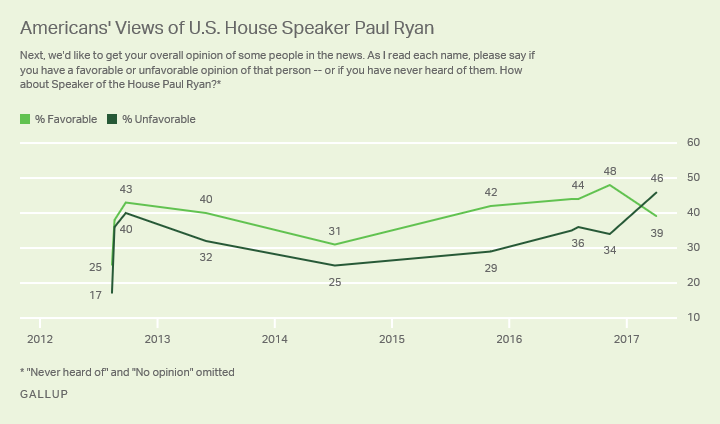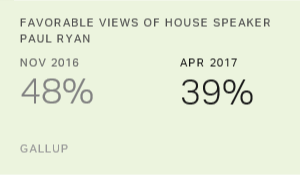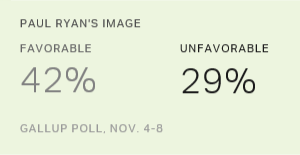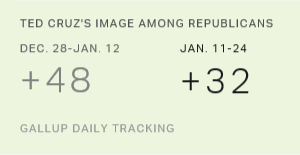House Speaker Paul Ryan announced Wednesday that he will retire from Congress after his current term ends in January. Ryan's disclosure ends months of speculation that the 10-term representative from Wisconsin would make this move. Ryan will continue to act as House speaker through the beginning of next year.
Gallup first measured Americans' views of Ryan in 2012 when Republican presidential nominee Mitt Romney chose Ryan as his vice presidential running mate. Throughout Gallup polls from 2012 to 2016, more Americans viewed him favorably than unfavorably. However, that changed in early 2017, shortly after congressional Republicans failed to repeal the Affordable Care Act (ACA) and President Donald Trump took office.
Ryan's image among Americans suffered significantly in 2017: Gallup's most recent poll on Americans' opinions of Ryan took place in April 2017, after Republicans in Congress -- under Ryan's leadership -- failed to enact legislation that would fulfill Trump's promise to "repeal and replace" the ACA. At that time, nearly half of Americans (46%) said they viewed the speaker unfavorably, up from 34% who said the same in November 2016. There was a coinciding slide in the percentage of Americans who viewed Ryan favorably, to 39% in April 2017 from 48% in November 2016.

Gallup's April 2017 reading on Ryan's image is similar to a more recent CNN poll from December, which found 45% viewing the speaker unfavorably and 35% favorably.
Ryan's image was particularly negative among Democrats in 2017: Although congressional Republicans failed to enact a wholesale repeal of the ACA in 2017, Ryan's role in the effort may have soured Democrats' views of him. In Gallup's April 2017 poll, 14% of Democrats said they had favorable views of Ryan, down from 39% the previous November. Around the same time, 86% of Democrats said they approved of the ACA. Additionally, this slump in Ryan's favorable ratings occurred soon after Trump took office, perhaps affecting Democrats' views of the House speaker.
| Republicans | Independents | Democrats | |||||||||||||||||||||||||||||||||||||||||||||||||||||||||||||||||||||||||||||||||||||||||||||||||
|---|---|---|---|---|---|---|---|---|---|---|---|---|---|---|---|---|---|---|---|---|---|---|---|---|---|---|---|---|---|---|---|---|---|---|---|---|---|---|---|---|---|---|---|---|---|---|---|---|---|---|---|---|---|---|---|---|---|---|---|---|---|---|---|---|---|---|---|---|---|---|---|---|---|---|---|---|---|---|---|---|---|---|---|---|---|---|---|---|---|---|---|---|---|---|---|---|---|---|---|
| % | % | % | |||||||||||||||||||||||||||||||||||||||||||||||||||||||||||||||||||||||||||||||||||||||||||||||||
| April 2017 | 66 | 39 | 14 | ||||||||||||||||||||||||||||||||||||||||||||||||||||||||||||||||||||||||||||||||||||||||||||||||
| November 2016 | 66 | 44 | 39 | ||||||||||||||||||||||||||||||||||||||||||||||||||||||||||||||||||||||||||||||||||||||||||||||||
| Gallup | |||||||||||||||||||||||||||||||||||||||||||||||||||||||||||||||||||||||||||||||||||||||||||||||||||
Meanwhile, Ryan's image held steady among Republicans, with two-thirds (66%) in April 2017 saying they had favorable views of him, unchanged from the previous November. These findings are similar to CNN's December poll results based on party identification, in which 12% of Democrats and 66% of Republicans viewed Ryan favorably.
Substantial drops in favorability are not unusual for House speakers: Ryan's predecessors suffered declining favorable ratings throughout their speakerships. Republican John Boehner began his speakership with a 42% favorable rating in January 2011, only to end with a 31% rating in October 2015. Democrat Nancy Pelosi saw an even larger decline throughout her tenure -- 44% of Americans had favorable views of her in January 2007, but that figure dropped to 29% in October 2010 toward the end of her speakership.
Takeaway: Ryan's decision to depart from the House is the latest in a series of GOP retirement announcements. Although Ryan remains popular among Republicans, his overall image has clearly taken a negative turn with the rest of Americans. His declining popularity aside, Ryan has stated that he wants to spend more time with his family. Had he sought another term as speaker, he likely would have faced additional hurdles heading into what appears to be a daunting election cycle for Republicans, with Democratic challenges to his Wisconsin House seat this year and his sometimes-troubled relationship with Trump.



